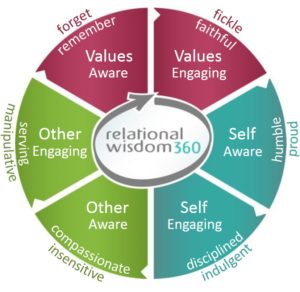A Special Application of Relational Wisdom
Conflict typically stresses and strains relationships. When disappointments, offenses, or unmet expectations pile up, our relationships with other people can be damaged or even destroyed.

Getting Upstream of Conflict
Both peacemaking and relational wisdom promote a fundamental transformation of character and lifestyle as people learn to relate to one another more respectfully and constructively.
While each system has both proactive and reactive components, they differ in their primary focus. Peacemaking focuses mainly on resolving conflict and reconciling broken relationships. Relational wisdom focuses mainly on preventing conflict by building healthy, empathetic relationships.

This pattern is not inevitable, however. By improving your relational wisdom you can actually “get upstream of conflict.”
For example, if you read your own moods well and avoid grumbling, or notice your spouse’s sad look and give a word of’ encouragement, or make a co-worker feel comfortable sharing a concern, you can often avoid many hours of conflict resolution later in the day.
Introduction to Peacemaking
No matter how well we practice relational wisdom, however, offenses and conflicts will occur—that’s life in a fallen world. Therefore it is wise for every person to learn how to be a peacemaker.

As you’ll see, these principles are so simple that children can apply them. But they are so powerful that they have been used to mediate and arbitrate bitter divorce and child custody actions, employment and business disputes, lawsuits and sexual abuse cases.
The following pages provide a brief summary of the wisdom principles we can apply to restore broken relationships.
- The Slippery Slope – A visual tool for understanding the ways people tend to and ought to respond to conflict.
- The Four G’s of Peacemaking (Values-based version)
- Go higher (live up to your highest and best values)
- Get the log out of your own eye (take responsibility for your contribution to a problem)
- Gently Restore (graciously help others to see their contribution to a problem)
- Go and be reconciled (forgive others as you want to be forgiven)
- The Seven A’s of Confession – A guide to making a sincere and complete confession.
- The Four Promises of Forgiveness – A great way to remember what you are really saying (and committing to) when you say “I forgive you.”
- The PAUSE Principle – An interest-based approach to negotiation.
Deepen Your Peacemaking Skills
Peacemaking is difficult to learn in the heat of a conflict, when emotions have flared and rational thinking has diminished. One way to begin developing better peacemaking skills before differences arise is to use minor conflicts as opportunities to practice these peacemaking skills. By doing so, you’ll be better prepared to apply these concepts when major differences arise.
If you would like to begin deliberately improving your conflict resolution skills, consider RW360’s faith-based course, Relational Peacemaking. A values-based (secular) version of this training is under development and should be available by the fall of 2024.
For a faith-based version of these peacemaking principles, click here.
–Ken Sande

